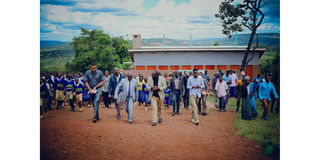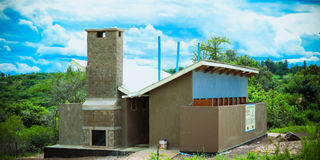New classrooms, toilets bring hope to pupils in Karagwe

The Kagera Region Assistant Administrative secretary Bwai Biseko (second left, blue tie) and other officials during a hand over ceremony of new classes and toilets at Chema primary school in Nyakabanga ward, Karagwe district council in Kagera region over the weekend
Karagwe. Over 400 pupils at Chema Primary School in Nyakabanga Ward, Karagwe District, Kagera Region, have received a significant boost to their learning environment following the construction of a new two-classroom block and 20 modern toilet facilities.
The infrastructure, valued at more than Sh85 million, was handed over this past weekend in a ceremony attended by local officials, community members, and representatives from the implementing organisations.
The project was made possible through Tanzania-based Kinda Education Support (KESU), with financial backing from Swiss Seaside Foundation and Robert und Renate Rath Stiftung, philanthropic organisations based in Germany.
Speaking during the handover, the school’s head teacher, Evodius Constantine, said the new facilities will ease congestion and improve hygiene for students and teachers alike.
“Since the school was established in 2003, we’ve struggled with limited space. These new classrooms bring us to a total of eight, making a big difference in creating a conducive learning environment,” he said.

Each of the new classrooms has been furnished with 30 desks, a teacher’s table, and chairs. In addition, the 20 VIP toilets were constructed with special consideration for semi-arid areas where water is scarce. Among them, one is tailored for pupils with disabilities, while another is dedicated to menstrual hygiene management (MHM) — fully equipped with a cupboard, mirror, soap, water, towels, and an incinerator.
Standard 7 pupil Sharon couldn’t hide her joy.
“Our old classroom would flood every rainy season—it felt like learning in a lake,” she said. “Now, we have proper rooms, and we don’t have to queue long for the toilets.”
Regional leaders applaud the effort
The Assistant Administrative Secretary for Kagera Region, Mr Bwai Biseko, praised the initiative, saying the project aligns with the government’s efforts to raise education standards across the country.
“We commend KESU and its partners for investing in the people of Nyakabanga. Such partnerships elevate the quality of education in our region,” Mr Biseko said.
KESU Programme Manager Lameck Kiula explained that the Chema Primary School initiative is part of a broader infrastructure programme the organisation is implementing in five districts across Kagera.
“In total, 21 classrooms are under construction in Biharamulo (4), Misenyi (5), Bukoba District (7), Kyerwa (2), and Muleba (3),” he noted.
The funding model sees KESU contributing 60 percent, with local communities adding 10%, and the government supporting 30% of the costs.
Community engagement and sustainability
In a bid to ensure long-term sustainability, KESU held a community seminar in March 2025 involving local leaders, school committee members, and pupils. The seminar focused on environmental conservation, menstrual hygiene, and parental responsibility in supporting both boys’ and girls’ education.
Schools were encouraged to plant fruit and coffee trees as part of income-generating activities to support maintenance and expansion.
“We want the community to take full ownership of these facilities. This is their school, and its future depends on them,” Mr Kiula said.
Beyond infrastructure
KESU’s approach is grounded in three key pillars: improving learning infrastructure, supporting quality education, and promoting gender equality, particularly for vulnerable groups.
With projects like this, the organisation hopes to bridge the infrastructure gap in rural schools and support long-term academic and social development in underserved regions.





